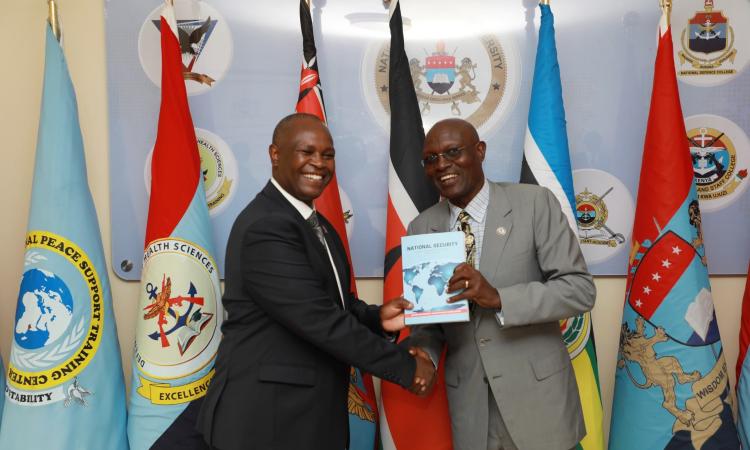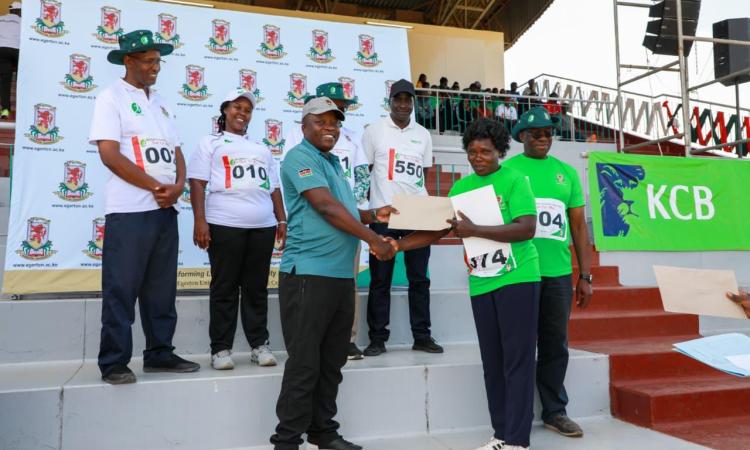Call for Empirical Research Papers - The National Security Journal Vol 2 Issue 1
The National Security Journal is a bi-annual peer reviewed Journal of National Defence University-Kenya (NDU-K) produced by the University’s Centre for Security and Strategic Studies (CSSS), a National ‘Think tank’ in Defence, Security, Policy and Strategy. The Journal is a publication dedicated to promoting scholarly debate in the field of Defence, Security, Policy and Strategy through research. The theme for this particular edition, Volume 2 Issue 1 which is scheduled for publication in Murch 2024 is Securing the Cyber space for national security and development. To operationalize the above theme, the following sub themes have been identified to guide authors:
- Cyber Security governance
- Cyber security policy laws and regulations
- Cyber security standards
- Cyber Security capacity and capabilities
- Partnerships and collaborations
- Role of private sector partnership in cyber security
- Emerging technologies: Artificial intelligence and other emerging technologies
- Public awareness and sensitization
- Training capacity and capabilities
The CSSS invites well researched, scholarly and empirical research papers based on the above theme from Stakeholders, Scholars and Practitioners. These empirical Papers should be original, well researched and analytical with realistic and relevant policy recommendations and should not be under publications elsewhere. To allow for initial review, kindly submit your Abstract to the Editorial Board by Monday 22 January 2024.
Guidelines for submission are as follows:
a. Manuscript Submission Format. All text must be typed in 12-point Times New Roman font with 1.5 line spacing. Margins should be at least 1 inch on all four sides. You may cite your own work by using the appropriate formal writing voice/avoid the use of first-person pronouns. The paper should have the following sections/headings:
(1) Introduction. The introduction is a critical component of the article writing process. An introduction not only presents your topic and your position on it, but it also (places/contextualizes) your argument within the larger academic area. Take note of any pertinent controversies or disagreements in the field. Finish with a brief summary of the overarching goal of the work and a comment on whether or not that goal was met.
(2) Theoretical basis. Provide the theoretical lenses through which your work can be understood. Salient debates within the area of study should be evident.
(3) Methodology. Provide the research design, target population, sampling procedures adopted and method of analysis.
(4) Discussion/Analysis of Findings. Provide information to give context to the topic.
- Present this clearly and feel free to use subheadings in this section.
- The article must demonstrate a wide readership and be intellectually persuasive.
- All statements made in the article, including in this section of the article, should be supported. Over citation in an article is discouraged.
- The paper should as much as possible use the language of the subject matter.
- Avoid value-laden words, phraseology and/or statements. They communicate bias and affect the reader’s perception of the author’s objectivity.
- Factcheck all content that involves numbers, places, volume, years, degrees of severity, and income among others.
(5) Conclusion. Summarizes the article’s key points.
(6) Recommendations. Are based on analysis and should be bulleted.
(7) References (Sources). The APA Style Version 7 (2020) referencing style is to be used. Include links to online sources.
b. Abstract. Papers will be preceded by an abstract of between 200 - 300 words describing the purpose, methods, general findings and recommendations of the study and should contain a minimum of five (5) key words listed in alphabetical order.
c. Title Page. The complete manuscript title, name(s) and addresses of author(s), institutional affiliations and status should be clearly stated on this page.
d. Page Numbering. Pages should be numbered consecutively.
e. Biography Page. Please provide a short biography (fewer than 100 words) for yourself and each author, if the paper is the work of more than one author.
f. Authors. The author(s) are responsible for securing permission to reproduce all copyrighted figures or materials before they are published by this Journal. A copy of the written permission must be included with the manuscript submission. Where applicable, author(s) must submit a copy of research permit and documents of authorisation.
g. Timelines. The following timelines will be observed:
- Submission of Abstracts by 18th January 2024
- Submission of Full Papers by 29th February 2024
- Peer review (Internal and External ) to end by 7th March 2024
- Resubmission of corrected Papers by 21st March 2024
- Copy editing to be done by 5th April 2024
- Design, typesetting and Publication by 20th April 2024
Conclusion
Accepted Papers which should be between 5,000 and 6,000 Words in length including text and references (excluding tables and figures) will be prepared and launched as per the above programme and can be subsequently accessed on the NDU-K website: http://www.ndu.ac.ke.
Submission of Abstract and Papers in soft copy (MS Word) should be addressed to the Director, CSSS and Journal Chief Editor through the email address director-csss@ndu.ac.ke and copied to peterlinusouma@gmail.com Clarification can be made through cell phone numbers +254723484697 and +254722366004.


